Dr. Worthless
Authors: Harold Schechter and Eric Powell
Artist: Eric Powell
Publisher: Dark Horse Comic
Dr. Fredrik Versam almost killed the American comics industry with a simple idea. Indecent and violent entertainment allows children to rely on delinquency. Superman supported truth and justice, but he did so by punishing criminals with violence. This means that kids will go out into the schoolyard and beat the bully pointlessly. This is the first step towards greater criminal activity. As a same principle, horror comics will drive murderers and sexual deviants out of children from children due to their horrifying “tasteless” content. With these debates in America in place and experiencing both the horror and the red horror of juvenile delinquency, Versam laid the foundation for what would ultimately become the authority of the comic code, a censorship mechanism that strips away the “immoral” comics. Many of these views were further developed in the 1954 book, “Seduction of the Innocent.” This is a book that will change comics forever.
Have you heard of Eric Powell and Harold Schechter and the team behind Exeven what Eddie Gaine did? (To tackle this problematic giant in a book called Dr. Welsles about a serial killer who targeted women and made furniture from the human parts, it was a safe bet to consider struggling with the dangers of a moral crusade looking for a scapegoat of popular culture. There is a part there, but it is not free for a controversial doctor. The exact opposite. It is a book on good and evil, and how to carve a dark path to others despite the nobility of their intentions.
Dr. Worthless approaches Vertum and achieves clear goals. This is to explain how he gave the cartoon the closest brush to cultural death. The structure is similar to the team’s Ed Gein Book. In this book, the intention is not just biography. Powell and Schector have important targets they want to meet, so they are turning their stories towards them. For Gein, it was about telling the events that led to the creation of a butcher in Plainfield. For Vertum, it’s about how he became a comic book boogeyman. But there’s something more to Versam and he gets the treatment he deserves.
Powell and Schector present not only one Versam, but some. First, we look at early doctors who stumble at the need for validation at every turn in their ego and psychiatry. This part reads as: (Not surprising given Schector’s background). He meets and researches serial killer Albert Fish and other mentally ill murderers. From there, we have studied the social environment and how black children develop permanent psychological problems due to segregation, poverty, and racism (caused him to the point of treating black patients in Harlem for 25 cents in the session); And finally, we reach the comic crusades and how it connects with his past works.
Through these stages we are invited to embrace the complexities of men to consider whether his influence on the comics should be something we remember him. It is a well-balanced exercise in non-fiction storytelling that will keep you from thinking for your readers. Powell and Schector portray a man obsessed with his position among their peers only to transition seamlessly when he became a civil rights champion (by providing important trial testimony on school separation), then show how he succumbed to the best and worst parts of himself. It raises questions about whether good can outweigh bad things, and whether negatives should determine the course of the entire story.
Powell carefully captures all three Walthams each need. A master of facial expressions, he strips the doctor’s contradictory and contradictory psychology naked to explain each stage. It humanizes him, but taking into account humans reminds us to embrace his unique ability, to be as good a force as good as bad a man at one time in a lifetime. In this sense, Powell and Schechter developed a sober study of human imperfections essentially.
Schechter’s attention to detail is thorough and deeply insightful, yet insightful. There are pages with little space for Powell to draw. That’s hard to find anything to cut from there. With less than 200 comic pages, he tells the story of Versam’s origins, explores some of America’s most frightening encounters with violence, and offers a crash course on the history of American comics and the roles he played in them. You will learn and be horrible. And thanks to the shared opinions he has available, many cartoon fans and creators will feel digging when they came under the cross of persecution and horror.
If Versam’s story ended with his work on the effects that living conditions had on children and how his discoveries helped parents’ rights cases, he would likely remember the doctor as a key contributor to the fight against school separation. We discussed his reputation as a caring physician who empathized with all his patients more openly. But goodwill is not a guarantee of actual goodness. His comic book Crusade will shape his legacy, opportunistic, obsession. Powell and Schector clarify this point and provide a portrayal of a man who shows the simplest from worthy to unworthy in the grand plan of things.
Dr. Worthless is out now
Read more amazing reviews of Beat!
Like this:
Like loading…


